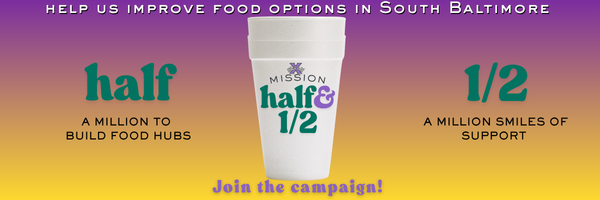Mission 1/2 & Half
We're raising half a million dollars while putting smiles on half a million faces

In celebration of 10 years of operation, Black Yield Institute is proud to dedicate this year to a campaign that we've affectionately named Mission Half and Half. We aim to improve food options in South Baltimore by raising half a million dollars to build food hubs in Baltimore City and providing half a million smiles of support.
For generations, Black communities have been systematically excluded from food sovereignty and land ownership. Limited access to fresh, culturally relevant, and affordable food is a direct consequence of food apartheid, a structural issue that disproportionately impacts Black and marginalized communities. In Baltimore and beyond, Black people face an intentional lack of food access, leading to health disparities, economic disenfranchisement, and dependency on external food sources.
BYI envisions a future where Black communities have full control over their food systems, land, and economic resources—a world where food is a tool of liberation, not oppression. Through agriculture, education, cooperative economics, and community organizing, we are building self-determined Black-led food economies that nourish, sustain, and uplift our people.
At BYI, we hold fast to the guiding principle that we must keep pushing until we find our place in the sun. No matter how oppressive the systems we face, we continue the struggle for Black food sovereignty—building institutions, reclaiming land, and shaping an abundant future for our people.
BYI is an unapologetically Black, place-based, people-centered movement for Black land and food sovereignty. We exist to organize, educate, and activate Black communities to reclaim food sovereignty through ownership of land, cooperative food enterprises, and advocacy policy. We are disrupting and replacing the systems that created food apartheid with systems that are designed, owned, and controlled by Black people for Black people.
Central to our movement is the belief that we must take care of each other—that no one is truly free unless we all are nourished, empowered, and equipped to thrive. Food is not just about survival; it is about building strong, interdependent Black communities where we care for one another across generations.